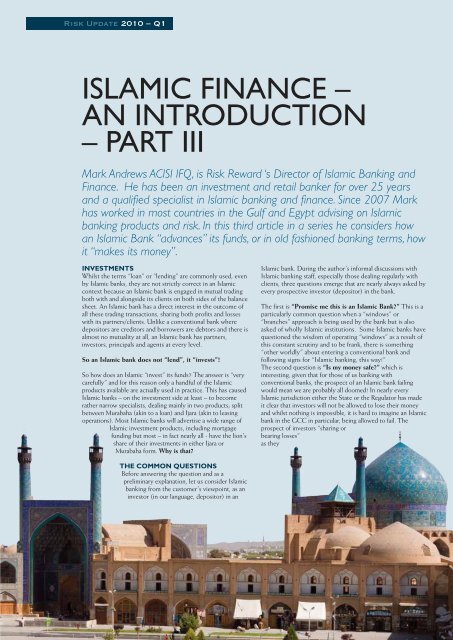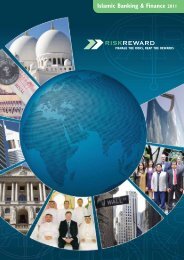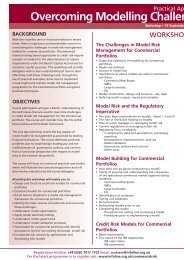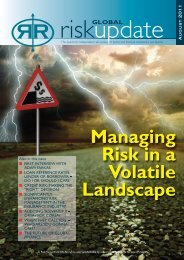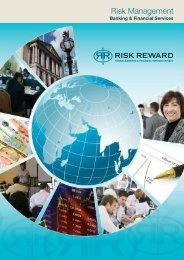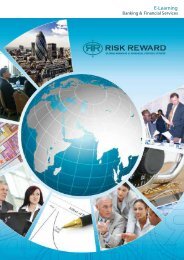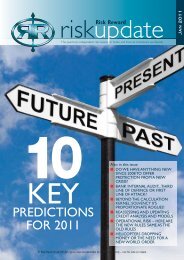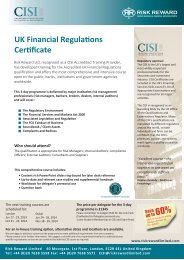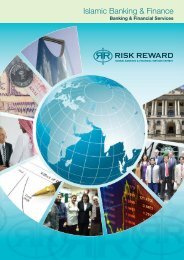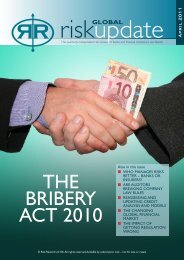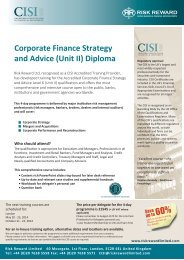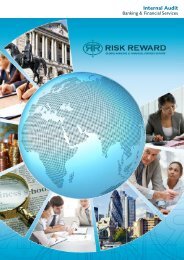Islamic Finance â an Introduction â Part III - Risk Reward Limited
Islamic Finance â an Introduction â Part III - Risk Reward Limited
Islamic Finance â an Introduction â Part III - Risk Reward Limited
You also want an ePaper? Increase the reach of your titles
YUMPU automatically turns print PDFs into web optimized ePapers that Google loves.
<strong>Risk</strong> Update 2010 – Q1<br />
ISLAMIC FINANCE –<br />
AN INTRODUCTION<br />
– PART <strong>III</strong><br />
Mark Andrews ACISI IFQ, is <strong>Risk</strong> <strong>Reward</strong> ‘s Director of <strong>Islamic</strong> B<strong>an</strong>king <strong>an</strong>d<br />
<strong>Fin<strong>an</strong>ce</strong>. He has been <strong>an</strong> investment <strong>an</strong>d retail b<strong>an</strong>ker for over 25 years<br />
<strong>an</strong>d a qualified specialist in <strong>Islamic</strong> b<strong>an</strong>king <strong>an</strong>d fin<strong>an</strong>ce. Since 2007 Mark<br />
has worked in most countries in the Gulf <strong>an</strong>d Egypt advising on <strong>Islamic</strong><br />
b<strong>an</strong>king products <strong>an</strong>d risk. In this third article in a series he considers how<br />
<strong>an</strong> <strong>Islamic</strong> B<strong>an</strong>k “adv<strong>an</strong>ces” its funds, or in old fashioned b<strong>an</strong>king terms, how<br />
it “makes its money”.<br />
INVESTMENTS<br />
Whilst the terms “lo<strong>an</strong>” or “lending” are commonly used, even<br />
by <strong>Islamic</strong> b<strong>an</strong>ks, they are not strictly correct in <strong>an</strong> <strong>Islamic</strong><br />
context because <strong>an</strong> <strong>Islamic</strong> b<strong>an</strong>k is engaged in mutual trading<br />
both with <strong>an</strong>d alongside its clients on both sides of the bal<strong>an</strong>ce<br />
sheet. An <strong>Islamic</strong> b<strong>an</strong>k has a direct interest in the outcome of<br />
all these trading tr<strong>an</strong>sactions, sharing both profits <strong>an</strong>d losses<br />
with its partners/clients. Unlike a conventional b<strong>an</strong>k where<br />
depositors are creditors <strong>an</strong>d borrowers are debtors <strong>an</strong>d there is<br />
almost no mutuality at all, <strong>an</strong> <strong>Islamic</strong> b<strong>an</strong>k has partners,<br />
investors, principals <strong>an</strong>d agents at every level.<br />
So <strong>an</strong> <strong>Islamic</strong> b<strong>an</strong>k does not “lend”, it “invests”!<br />
So how does <strong>an</strong> <strong>Islamic</strong> “invest” its funds The <strong>an</strong>swer is “very<br />
carefully” <strong>an</strong>d for this reason only a h<strong>an</strong>dful of the <strong>Islamic</strong><br />
products available are actually used in practice. This has caused<br />
<strong>Islamic</strong> b<strong>an</strong>ks – on the investment side at least – to become<br />
rather narrow specialists, dealing mainly in two products; split<br />
between Murabaha (akin to a lo<strong>an</strong>) <strong>an</strong>d Ijara (akin to leasing<br />
operations). Most <strong>Islamic</strong> b<strong>an</strong>ks will advertise a wide r<strong>an</strong>ge of<br />
<strong>Islamic</strong> investment products, including mortgage<br />
funding but most – in fact nearly all - have the lion’s<br />
share of their investments in either Ijara or<br />
Murabaha form. Why is that<br />
<strong>Islamic</strong> b<strong>an</strong>k. During the author’s informal discussions with<br />
<strong>Islamic</strong> b<strong>an</strong>king staff, especially those dealing regularly with<br />
clients, three questions emerge that are nearly always asked by<br />
every prospective investor (depositor) in the b<strong>an</strong>k.<br />
The first is “Promise me this is <strong>an</strong> <strong>Islamic</strong> B<strong>an</strong>k” This is a<br />
particularly common question when a “windows” or<br />
“br<strong>an</strong>ches” approach is being used by the b<strong>an</strong>k but is also<br />
asked of wholly <strong>Islamic</strong> institutions. Some <strong>Islamic</strong> b<strong>an</strong>ks have<br />
questioned the wisdom of operating “windows” as a result of<br />
this const<strong>an</strong>t scrutiny <strong>an</strong>d to be fr<strong>an</strong>k, there is something<br />
“other worldly” about entering a conventional b<strong>an</strong>k <strong>an</strong>d<br />
following signs for “<strong>Islamic</strong> b<strong>an</strong>king, this way!”<br />
The second question is “Is my money safe” which is<br />
interesting, given that for those of us b<strong>an</strong>king with<br />
conventional b<strong>an</strong>ks, the prospect of <strong>an</strong> <strong>Islamic</strong> b<strong>an</strong>k failing<br />
would me<strong>an</strong> we are probably all doomed! In nearly every<br />
<strong>Islamic</strong> jurisdiction either the State or the Regulator has made<br />
it clear that investors will not be allowed to lose their money<br />
<strong>an</strong>d whilst nothing is impossible, it is hard to imagine <strong>an</strong> <strong>Islamic</strong><br />
b<strong>an</strong>k in the GCC in particular, being allowed to fail. The<br />
prospect of investors “sharing or<br />
bearing losses”<br />
as they<br />
THE COMMON QUESTIONS<br />
Before <strong>an</strong>swering the question <strong>an</strong>d as a<br />
preliminary expl<strong>an</strong>ation, let us consider <strong>Islamic</strong><br />
b<strong>an</strong>king from the customer’s viewpoint, as <strong>an</strong><br />
investor (in our l<strong>an</strong>guage, depositor) in <strong>an</strong>


